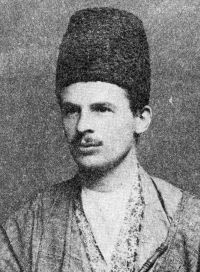Biography: Edward Granville Browne
 Edward Granville Browne was born in Gloucestershire, England on 7 February 1862. He studied medicine at the University of Cambridge and wrote several academic articles and books on the Orient. In April 1890 he met Bahá’u’lláh in four successive interviews. He wrote of his first meeting:
Edward Granville Browne was born in Gloucestershire, England on 7 February 1862. He studied medicine at the University of Cambridge and wrote several academic articles and books on the Orient. In April 1890 he met Bahá’u’lláh in four successive interviews. He wrote of his first meeting:
The face of Him on Whom I gazed I can never forget, though I cannot describe it. Those piercing eyes seemed to read one’s very soul; power and authority sat on that ample brow.… No need to ask in whose presence I stood, as I bowed myself before one who is the object of a devotion and love which kings might envy and emperors sigh for in vain.
On his return to Cambridge Browne translated a history of the Faith titled A Traveler’s Narrative, not knowing at the time that its author was ‘Abdu’l-Bahá. Later, in 1912-1913, he met the Master in London and in Paris. The scholar described his impression of ‘Abdu’l-Bahá as follows:
Seldom have I seen one whose appearance impressed me more. A tall strongly-built man holding himself straight as an arrow, with white turban and raiment, long black locks reaching almost to the shoulder, broad powerful forehead indicating a strong intellect combined with an unswerving will, eyes keen as a hawk’s, and strongly-marked but pleasing features–such was my first impression of ‘Abbas Efendi [sic], ‘the master’ as he par excellence is called by the Bábís. Subsequent conversation with him served only to heighten the respect with which his appearance had from the first inspired me. One more eloquent of speech, more ready of argument, more apt of illustration, more intimately acquainted with the sacred books of the Jews, the Christians, and the Muhammadans, could, I should think, scarcely be found even amongst the eloquent, ready, and subtle race to which he belongs. These qualities, combined with a bearing at once majestic and genial, made me cease to wonder at the influence and esteem which he enjoyed even beyond the circle of his father’s followers. About the greatness of this man and his power no one who had seen him could entertain a doubt.
Balyuzi tells us that the collection of Browne’s papers in the University Library at Cambridge holds twelve letters written to him by ‘Abdu’l-Bahá in the time-period 1890-1913. The author gives us some glimmerings of the eternal truths which the Master shared with Professor Browne:
The bonds of amity between them, ‘Abdu’l-Bahá writes, are so strong that ‘absence is the same as presence’, and distance no bar to the hearts. He had always, He says, brought to remembrance ‘the days of our consorting’. He expresses the hope that they would meet once again. Time was too short, He states, to explain adequately the principles, the purposes, the conduct of the Faith, but He counts on the perspicacity and the intelligence of that ‘spiritual companion’ to comprehend the truth of the matter. He advises Browne to aim high and be rid of small nationalism, for whatever is of limited, local consequence is human- bound, and whatever benefits the world of man is celestial (p.98).
References
Balyuzi, H.M. (1970). Edward Granville Browne and the Bahá’í Faith. Oxford, UK: George Ronald.
Browne, Edward (1890). “Babism”, in: Religious Systems of the World, transcribed and proofread by Graham Sorenson.
Browne, Edward (1893). A Year Amongst the Persians, transcribed and proofread by Duane K. Troxel.
“Professor Browne meets Bahá’u’lláh” – The Life of Bahá’u’lláh, a photographic narrative.
Momen, Moojan (undated) “Edward Granville Browne”.
Photograph: http://www.h-net.org/~bahai/diglib/books/A-E/B/browne/Browne.jpg

